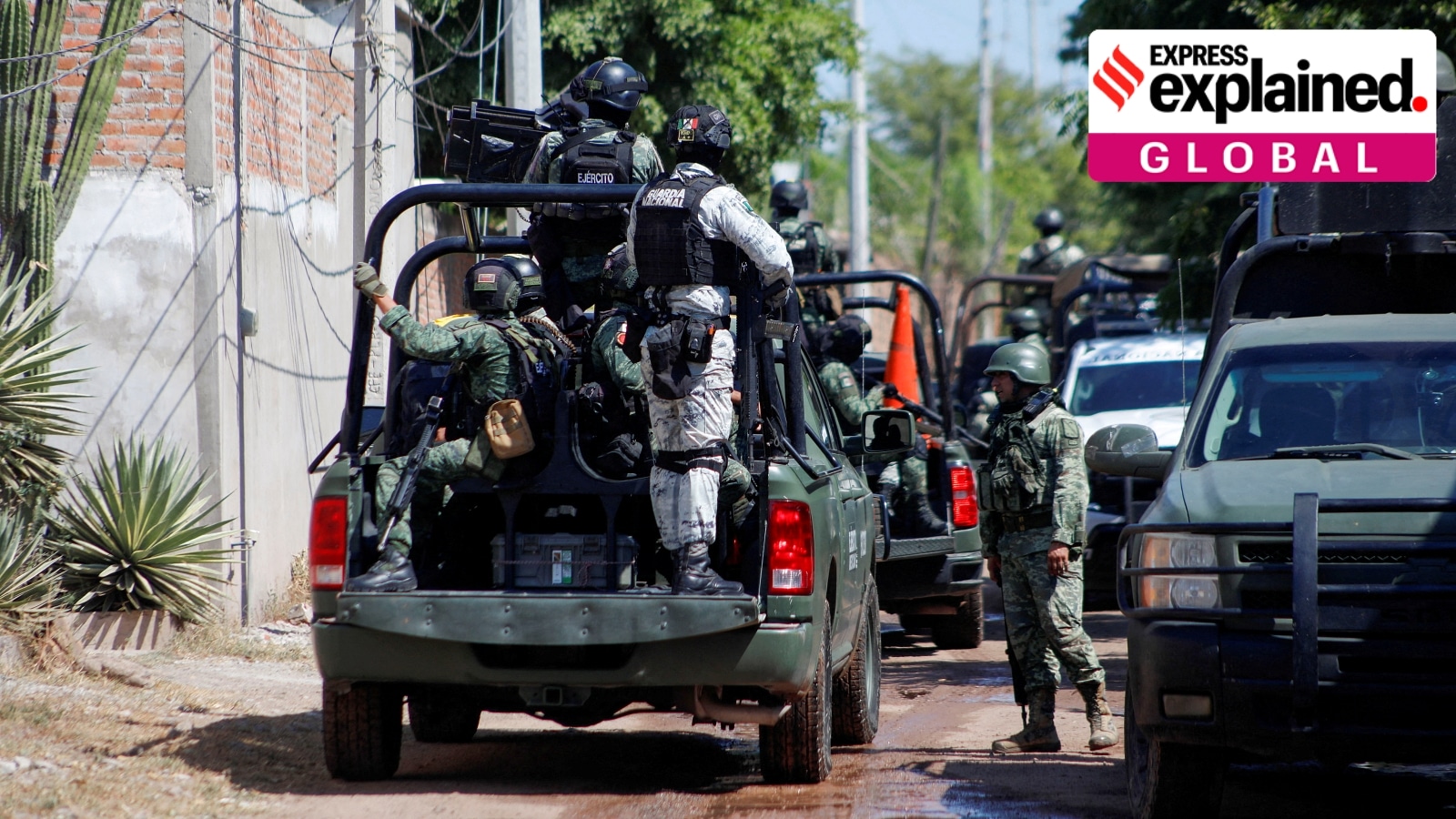What US designating Mexican cartels as Foreign Terrorist Organizations means
What is this designation? What are the criticisms of the Donald Trump administration’s latest move and how has Mexico reacted? We explain.
 Mexican forces at the scene of a suspected gang shootout on the outskirts of Culiacan, Sinaloa state, Mexico last October. (REUTERS/Jose Betanzos/File Photo)
Mexican forces at the scene of a suspected gang shootout on the outskirts of Culiacan, Sinaloa state, Mexico last October. (REUTERS/Jose Betanzos/File Photo)The United States on Wednesday (February 19) designated eight Latin American criminal groups as Foreign Terrorist Organizations (FTOs). Here’s all you need to know about what this designation means, what it changes, and why some have criticised the move by the Donald Trump administration.
The FTO designation
FTOs are foreign organisations that are designated by the Secretary of State — in the latest instance Marco Rubio — in accordance to Section 219 of the Immigration and Nationality Act.
That means they’re eligible for drone strikes https://t.co/aWxKkeAinG
— Elon Musk (@elonmusk) February 19, 2025
According to the Act, the Secretary is “authorised to designate an organisation as a foreign terrorist organization” on the condition that it either “engages in terrorist activity” or “retains the capability and intent to engage in terrorist activity or terrorism”, and that this activity threatens the security the US and its citizens. The term “terrorism” is rather broadly defined by a number of US laws, and can include a gamut of criminal offences such as sabotage, kidnap, hijacking, killing or causing bodily harm, etc.
While many laws do not specify motivation when defining a terrorist act, the Foreign Relations Authorization Act (FRAA), which the FTO designation relies on, defines terrorism as “premeditated, politically motivated violence perpetrated against noncombatant targets by subnational groups or clandestine agents”.
FTOs must be re-designated every two years.
What designation entails
According to the website of the US State Department, FTO designations are critical in the United States’ “fight against terrorism and are an effective means of curtailing support for terrorist activities and pressuring groups to get out of the terrorism business.” There are 77 listed FTOs at the moment, including the likes of Al Qaeda, ISIS (and its multiple offshoots), Hamas, Indian Mujahideen, Jamat ud Dawa, etc.
In practical terms, such a designation has a few primary consequences.
- It is unlawful for a person in the US to knowingly provide “material support or resources” to a designated FTO. The term “material support or resources” is defined as “any property, tangible or intangible, or service, including currency or monetary instruments or financial securities, financial services, lodging, training, expert advice or assistance, safehouses, false documentation or identification, communications equipment, facilities, weapons, lethal substances, explosives, personnel, and transportation, except medicine or religious materials.”
- US financial institutions possessing or controlling any assets of a designated FTO may be required to block all transactions involving those assets, in effect giving American agencies greater power to clamp down on terror financing.
An FTO designation is essentially meant to work like sanctions, but for specific organisations not nation states.
- Lastly, representatives and members of a designated FTO, if they are not from the US, are inadmissible to, and in certain circumstances removable from, the US. This can, in theory, be used by the Trump administration to specifically crack down on undocumented migration. (More on that later).
What critics say
Tren de Aragua, Mara Salvatrucha (also known as MS-13), Cartel de Sinaloa, Cartel de Jalisco Nueva Generacion, Carteles Unidos, Cartel de Noreste, Cartel del Golfo and La Nueva Familia Michoacana are the eight groups named in Wednesday’s notice. Critics say that while these groups do commit acts of violence and exploitation, they do not possess the ideological motivations typically attributed to terrorists — and integral to the definition of terrorism in the FRAA.
Many fear that in the context of the anti-migration — specifically anti-Mexican and Latin American — rhetoric coming out of Donald Trump’s White House, these designations will effectively provide the President cover to expand his fight against migration, and possibly commit human rights violations.
“I think it’s of concern that this is coming in the context of rhetoric out of the White House that conflates migration with crime, drugs and, now, terrorism,” Stephanie Brewer, of the research group Washington Office on Latin America (WOLA), told Al Jazeera.
Will Freeman, a fellow for Latin America studies at the Council on Foreign Relations, was more specific. “You could accuse anyone — from a migrant who pays a smuggler to a Mexican business that is forced to pay a ‘protection fee’ — of offering material or financial support to a terrorist organisation,” he told Al Jazeera.
How Mexico has responded
For Mexico, these designations are of particular concern. Trump has previously stated that the Mexican government has an “intolerable alliance” with the cartels. With seven of the eight designated organisations either based out of Mexico or with deep roots in the country — Tren de Aragua is Venezuela-based — some fear that these designations might be used as an excuse by the US to carry out military operations on Mexican soil.
These fears were reflected by what billionaire Trump-ally Elon Musk posted on X soon after the designations were made. “That means they’re eligible for drone strikes,” he wrote.
Reacting to this development, Mexico President Claudia Sheinbaum, said on Wednesday: “What we do not accept is the violation of our sovereignty” although she did mention that this would also open up new “very good” possibilities to partner with the US against the cartels.
She has since toughened her stance. On Thursday, Sheinbaum said: “The people of Mexico, under no circumstances will accept interventions, interference or any other act from abroad that is harmful to the integrity, independence and sovereignty of the nation”.
Sheinbaum has also proposed another reform to target “any national or foreigner involved in the illicit manufacture, distribution, disposal, transfer and internment of weapons into [Mexican] national territory” — a veiled dig at the US role in arming these cartels in the first place.
American guns have long been identified as the primary source of firepower for criminal groups across Latin America. Mexico has claimed in the past that “almost all” weapons recovered from crime scenes — between 70% and 90% — were trafficked from the US into Mexico, CNN reported.
- 01
- 02
- 03
- 04
- 05






































